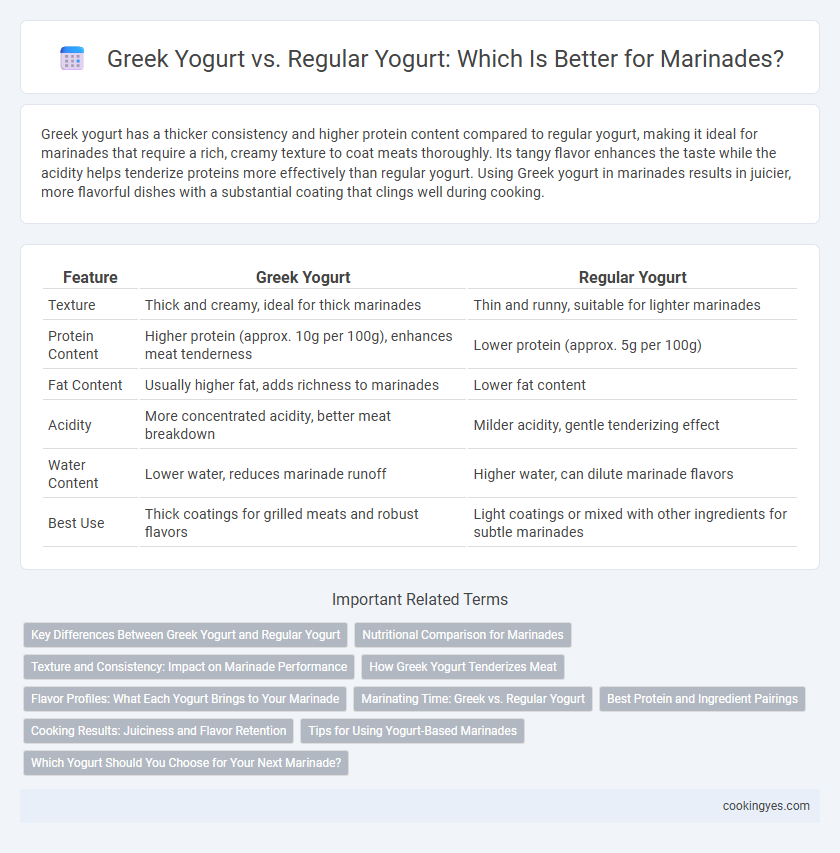Greek yogurt has a thicker consistency and higher protein content compared to regular yogurt, making it ideal for marinades that require a rich, creamy texture to coat meats thoroughly. Its tangy flavor enhances the taste while the acidity helps tenderize proteins more effectively than regular yogurt. Using Greek yogurt in marinades results in juicier, more flavorful dishes with a substantial coating that clings well during cooking.
Table of Comparison
| Feature | Greek Yogurt | Regular Yogurt |
|---|---|---|
| Texture | Thick and creamy, ideal for thick marinades | Thin and runny, suitable for lighter marinades |
| Protein Content | Higher protein (approx. 10g per 100g), enhances meat tenderness | Lower protein (approx. 5g per 100g) |
| Fat Content | Usually higher fat, adds richness to marinades | Lower fat content |
| Acidity | More concentrated acidity, better meat breakdown | Milder acidity, gentle tenderizing effect |
| Water Content | Lower water, reduces marinade runoff | Higher water, can dilute marinade flavors |
| Best Use | Thick coatings for grilled meats and robust flavors | Light coatings or mixed with other ingredients for subtle marinades |
Key Differences Between Greek Yogurt and Regular Yogurt
Greek yogurt has a thicker, creamier texture due to straining, making it ideal for marinades that require a rich coating and longer adherence on meats. Regular yogurt contains more whey and water content, resulting in a thinner consistency that penetrates more quickly but may dilute flavors in marinades. The higher protein content in Greek yogurt enhances tenderizing effects, while the mild acidity in both types aids in breaking down muscle fibers during marination.
Nutritional Comparison for Marinades
Greek yogurt contains higher protein levels and lower sugar content compared to regular yogurt, making it ideal for marinades that require a creamy texture and enhanced flavor absorption. Its thicker consistency helps coat meats evenly, while the probiotics and acidity tenderize proteins effectively. Regular yogurt, with its higher moisture content, may result in a less concentrated marinade that can dilute seasoning intensity.
Texture and Consistency: Impact on Marinade Performance
Greek yogurt's thick, creamy texture enables it to cling more effectively to meats, providing a consistent coating that enhances marinade absorption and flavor penetration. Regular yogurt, with its thinner consistency, tends to drip off easily, reducing marinade contact time and uniformity on the surface. This difference in texture impacts the marinade's overall performance, making Greek yogurt a preferred choice for tenderizing and flavor infusion in cooking.
How Greek Yogurt Tenderizes Meat
Greek yogurt contains higher protein content and thicker consistency than regular yogurt, making it an excellent choice for marinades that tenderize meat effectively. The lactic acid and enzymes in Greek yogurt break down muscle fibers and connective tissues, resulting in a more tender and flavorful dish. Its creamy texture helps the marinade adhere better to meat surfaces, enhancing both moisture retention and taste during cooking.
Flavor Profiles: What Each Yogurt Brings to Your Marinade
Greek yogurt offers a thicker texture and tangier flavor ideal for rich, creamy marinades that tenderize meat while adding a robust, slightly sour taste. Regular yogurt has a thinner consistency and milder flavor, providing a subtler tang that allows spices and herbs to shine without overpowering the dish. Both types contain natural enzymes and acidity that break down proteins effectively, enhancing meat tenderness and infusing flavors deeply.
Marinating Time: Greek vs. Regular Yogurt
Greek yogurt's thicker texture allows it to cling better to meats, enabling shorter marinating times of 30 minutes to 2 hours, while regular yogurt, being more liquid, requires longer marinating periods of 2 to 4 hours to effectively tenderize and infuse flavors. The higher protein content in Greek yogurt helps break down muscle fibers more efficiently, resulting in quicker absorption of spices and acids. Regular yogurt's higher moisture content can dilute marinades, making the process slower but potentially more suitable for delicate proteins like fish.
Best Protein and Ingredient Pairings
Greek yogurt contains higher protein levels, making it ideal for marinades that require tenderizing and adding nutritional value. Its thick texture pairs well with herbs like garlic, rosemary, and cumin, enhancing flavor absorption in meats and vegetables. Regular yogurt, while lower in protein, offers a milder taste and thinner consistency, suitable for lighter marinades with ingredients like lemon juice and dill.
Cooking Results: Juiciness and Flavor Retention
Greek yogurt's thicker texture and higher protein content create a creamier marinade that clings better to meats, enhancing juiciness during cooking. Its tangy flavor penetrates deeply, improving overall taste and tenderness compared to regular yogurt, which has a thinner consistency and milder flavor. Using Greek yogurt in marinades results in more flavorful, succulent dishes with better moisture retention.
Tips for Using Yogurt-Based Marinades
Greek yogurt's thick texture and higher protein content make it ideal for marinades, as it clings better to meats and provides a rich, creamy coating. Regular yogurt, being more fluid and tangy, easily penetrates fibers, tenderizing proteins effectively but may require longer marinating times. For optimal results, use Greek yogurt when you want a thick, flavorful crust and regular yogurt to deeply infuse marinades with moisture and subtle acidity.
Which Yogurt Should You Choose for Your Next Marinade?
Greek yogurt has a thicker consistency and higher protein content compared to regular yogurt, making it ideal for marinades that require a creamy texture and longer adherence to meats. Regular yogurt contains more moisture and a milder flavor, which can be beneficial for delicate proteins and lighter marinades. Choosing Greek yogurt enhances tenderness and flavor penetration, while regular yogurt offers a more subtle tang and softer coating.
Greek yogurt vs regular yogurt for marinades Infographic

 cookingyes.com
cookingyes.com